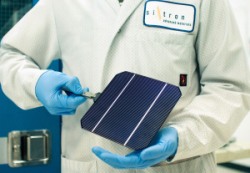Jan 28 2010
Sixtron Advanced Materials, a provider of safe and efficient silane-free coating solutions, today introduced its patent-pending Silexium™ technology, an antireflective passivation coating that nearly eliminates Light Induced Degradation (LID) in solar cells.
 Silexium coatings from Sixtron Advanced Materials nearly eliminate light induced degradation (LID) in monocrystalline solar cells.
Silexium coatings from Sixtron Advanced Materials nearly eliminate light induced degradation (LID) in monocrystalline solar cells.
A well known issue for solar cell and module manufacturers, LID reduces the efficiency of modules in the field by up to 5% in the first few hours of exposure to the sun, thus significantly reducing the net energy harvest. Sixtron has demonstrated that solar cells with a Silexium antireflective passivation coating exhibit at least 88% less LID than solar cells with traditional silane-based SiNx coatings.
The optimized process flow and reference architecture was developed by Sixtron at their development laboratory in Montreal with resulting cells benchmarked by the University Center for Excellence in Photovoltaics (UCEP) at the Georgia Institute of Technology. With appropriate process optimization, solar cells coated with Silexium films deliver net efficiency gains to existing production lines, delivering increased revenue and boosting profit margins for solar cell manufacturers. The precursor for Silexium films is delivered to industry standard plasma enhanced chemical vapor deposition (PECVD) equipment by Sixtron’s SunBox silane-free gas generation system. The SunBox system was awarded the Cell Award for Best Process Technology for c-Si Solar Cell Manufacturing at the 2009 Intersolar show in Munich, Germany.
“With the release of our Silexium process technology, Sixtron is addressing a major concern of cell and module manufacturers,” said Bates Marshall, VP of sales and marketing for Sixtron. “Sixtron’s Silexium process provides solar cell manufacturers with the only simple, low-cost solution to improve the efficiency of their products while simultaneously reducing manufacturing costs by eliminating the pyrophoric hazards of silane.”
To minimize the effects of LID, manufacturers of high-efficiency monocrystalline cells have until now been forced to specify expensive high-grade boron-doped p-type Czochralski (CZ) wafers or use alternatives to the traditional wafer manufacturing process to try to maintain end-of-line efficiency once cells are deployed to the field. Sixtron’s Silexium process technology now provides manufacturers with a drop-in solution to the LID problem that enables maximum flexibility within their silicon wafer supply chain. This delivers further economic advantages to cell manufacturers over higher-priced LID reducing technologies.
“We have known for some time that Sixtron's silane-free antireflective coatings were a novel, low-cost way to match the performance of silicon nitride coatings while also eliminating the dangers of silane gas," said Dr. Ajeet Rohatgi, founder and director of the University Center for Excellence in Photovoltaics (UCEP). "Our latest studies confirm that Sixtron's Silexium coatings can offer performance advantages over silane-based coatings by significantly reducing LID, a major obstacle for the majority of today's high-efficiency solar cell makers."
Solar cells made with Silexium coatings also deliver increased shunt resistance and reduced reverse current by an order of magnitude, representing additional significant protections against cell degradation. Shunting, also known as leakage, occurs when small defects in solar cells create alternate pathways for the flow of electricity; reverse currents, caused by shading and low light, create “hot spots” that can permanently damage the cells.